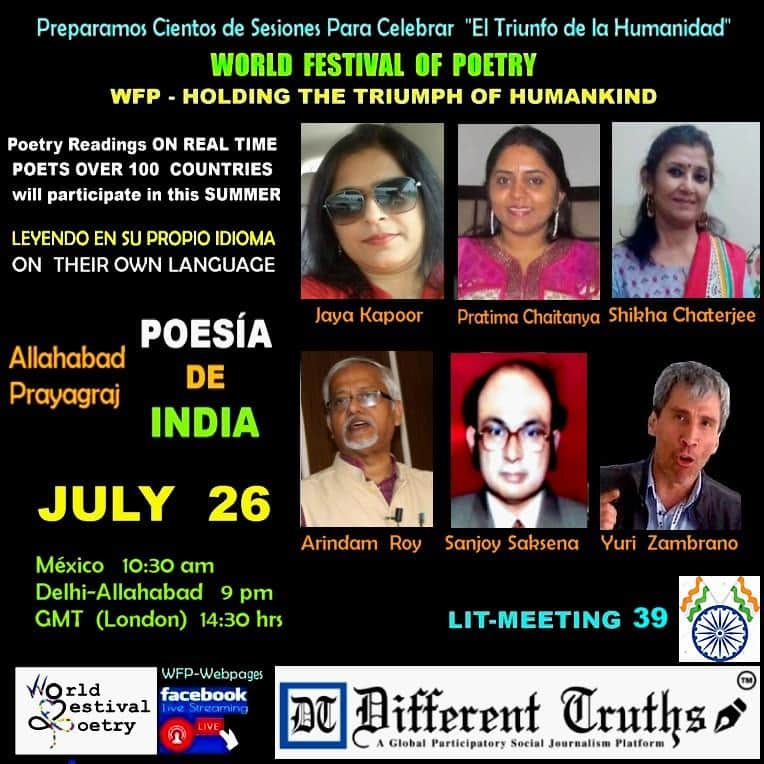On Sunday, July 26, five poets of Prayagraj recited and discussed poetry, in an event, Triumph of Mankind, jointly organised by the World Festival of Poetry (WFP) and Different Truths (DT). A report by Pratima, exclusively for Different Truths.
Five poets from the city of Prayagraj were invited to recite their poems in an event jointly hosted by the World Festival of Poetry (WFP) and Different Truths, on Sunday, July 26, 2020, on the StreamYard platform via Facebook Live.
WFP is hosting its Literary Meet with poets from over a hundred countries. Its 39th meet was jointly held with the acclaimed online eMagazine, Different Truths. When the entire world is facing the onslaught of Covid–19 virus, the motto of WFP meet 2020 is the ‘Triumph of Mankind’
WFP is hosting its Literary Meet with poets from over a hundred countries. Its 39th meet was jointly held with the acclaimed online eMagazine, Different Truths. When the entire world is facing the onslaught of Covid-19 virus, the motto of WFP meet 2020 is the ‘Triumph of Mankind’, which struck a note of optimism in one’s heart. One of the Global Directors of WFP, Yuri Zambrano, is a world-renowned poet from Mexico. In his inaugural speech, he extolled the religious and spiritual significance of the city of Prayagraj (old name, Allahabad), the land of Sangam and crossing of three rivers — the Ganga, the Yamuna and the mythical Saraswati. He expressed his happiness to hold the meet with the poets from the sacred city of Prayagraj.
The poets invited were Arindam Roy, Founder and Editor-in-Chief, Different Truths, Prof. Sanjoy Saksena, Dept of English, University of Allahabad, Dr. Jaya Kapoor, Dept of English, University of Allahabad, Dr. Pratima Chaitanya, Dept. of English, Jagat Taran Girls’ PG College and Dr. Shikha Chatterji, Dept. of English, SHUATS. The event was jointly conducted by Yuri and Arindam.
Arindam talked about the social evils rampant in society in Hunger, Poverty, Prostitution: A Scribe’s Jottings, an intense and scathing attack on social evils, poverty and suffering. His comparison of a sex worker to Chandalika and Ananda, of Tagore’s well-known dance-drama, Chandalika, drew special attention and comment from Yuri.
Arindam talked about the social evils rampant in society in Hunger, Poverty, Prostitution: A Scribe’s Jottings, an intense and scathing attack on social evils, poverty and suffering. His comparison of a sex worker to Chandalika and Ananda, of Tagore’s well-known dance-drama, Chandalika, drew special attention and comment from Yuri. His poem, A Home or a Tomb was about loss and loneliness and was filled with heart-wrenching poignancy. His poems on the impact of current Covid-19 crisis, on migrant labourers in, A Migrant Labourer’s Son, and about the environment issue in, Can we Save Man and Earth, were noteworthy.
Prof Sanjoy Saksena presented three poems. His evocative poem, Interface in Sisterhood, from his feminist phase, challenged the existing mores that chained women. His second poem, Meeting Down Cowley, Oxford, was about his chance meeting with an Anglo-Indian, while he was in Oxford and the interactions that they had, particularly about his faithful servant. His third poem, Picture of (Dis)Contentment, was about his impressions after his return from the Oxford. While women and children kept themselves warm by burning tyres, he was afraid of the poisonous fumes, was one of the powerful images in it.
Prof Sanjoy Saksena presented three poems. His evocative poem, Interface in Sisterhood, from his feminist phase, challenged the existing mores that chained women. His second poem, Meeting Down Cowley, Oxford, was about his chance meeting with an Anglo-Indian
Jaya Kapur Chaddha’s poem, For Your Memories Dear Unnamed Girl, brought out the dilemma and conflict faced by Indian women when they have to prioritise their marriage and leave their career goals behind. Her other poem, My Name, talked about the angst and identity crisis of women, who are required to change their surnames after marriage, while in her third poem, My Garden in Lockdown, Nature is celebrated. The pain and suffering endured by migrant labourers during Covid-19 crisis in India was talked about by her in Three Voices in COVID.
Pratima Chaitanya’s poem, The Bleeding Goddess, made a bold statement by challenging the menstrual myths in Indian society. Female foeticide was the subject of her poem, Dream of an Unborn and through The Wail of Supranakha, she questioned the stereotypical projection of women in mythology and life. Her poem, Threat of the Crowned Death, talked about how the current pandemic has broken the human sense of superiority.
Pratima Chaitanya’s poem, The Bleeding Goddess, made a bold statement by challenging the menstrual myths in Indian society. Female foeticide was the subject of her poem, Dream of an Unborn and through The Wail of Supranakha, she questioned the stereotypical projection of women in mythology and life.
Dr Shikha Chatterjee’s opening poem, In that Beauty I Got Drenched, celebrated Nature and reminded us about Tagore and his relationship with Nature. Her women-centric poem, Wonderous Women, talked of sheroes. A trained classical singer, on Yuri’s request, Shikha sang a stanza of a famous Hindi ghazal, enthralling the audience. Her third poem on the pandemic issue was, What a Changed World Order.
During the event, Yuri introduced all the poets in Spanish and added his observations in Spanish and English. All the poems read out in the session were profoundly appreciated by the viewers and left an indelible impact on all.
Photos sourced from WFP






 By
By
 By
By
 By
By